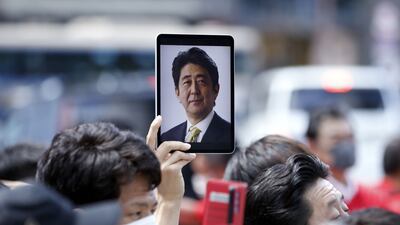Exit polls in Japan after Sunday's election, just two days after former prime minister Shinzo Abe was assassinated on the campaign trail, show a strong lead for his ruling Liberal Democratic Party and its coalition partner.
Prime Minister Fumio Kishida — also from the LDP, vowed not to bow to violence after the killing on Friday. He pressed ahead with the campaign and voting as planned, saying everything would be done to ensure security.
The LDP and the Komeito party were likely to win between 69 to 83 seats out of the 125 contested in Sunday's vote, according to exit polls.
"Given that the coalition has gained a majority, going over their goal, and the four parties that want to revise the constitution also have gone over the needed number of seats, you can say that this is a huge victory for the LDP. It's a very good result for the Kishida government," said Shigenobu Tamura, a former member of the LDP and political analyst.
"There's a possibility that the impact of Abe's killing led to the victory of the LDP in hotly contested districts. They've also expanded their seats in proportional representation," he added.
Half the seats in Japan's upper house of parliament are contested every three years, with an extra vacant seat also up for grabs this time, for a total of 125 out of the 248-strong chamber.
Elections for seats in the upper house are typically seen as a referendum on the sitting government, and the latest opinion polls pointed to a strong showing for the ruling bloc led by Mr Kishida.
Although the motive for the killing was unclear, sympathy votes could bolster Mr Kishida, formerly a foreign minister under Abe. The prime minister is seeking a solid victory that could open the way for what has been dubbed a “golden three years” in which he need not face another national election.
The body of Shinzo Abe was returned to Tokyo on Saturday as mourners gathered in the western city of Nara to pay respects at the place where he was killed.
Mourners lowered their heads as a black hearse carrying Abe’s body arrived at his home in Tokyo’s residential area of Shibuya.
Hundreds of people queued to leave flowers on a table next to a photo of the former prime minister. Local officials moved some of the offerings to create space as more tributes arrived.
A night vigil will be held on Monday, with Abe's funeral scheduled for Tuesday, attended by close friends, Japanese media reported.
US Secretary of State Antony Blinken will to travel to Japan for a condolence visit on Monday, the State Department said. He was holding talks with Thai leaders in Bangkok on Sunday after attending the G20 meeting of foreign ministers in Indonesia.
Police arrested Tetsuya Yamagami, 41 and a former member of Japan’s navy, at the scene on suspicion of murder. They confiscated a home-made gun and said several other weapons were later found at his home.
Abe's death has raised questions about security for public figures in Japan, where politicians commonly make direct appeals to voters in public places during campaigning season.
Mr Kishida, who took office after Abe stepped down in 2020, returned to the campaign trail after making an emergency return to Tokyo on Friday.
Abe, 67, served twice as prime minister — for one year in 2006-2007 and then from 2012-2020. He stepped down both occasions citing health reasons.










